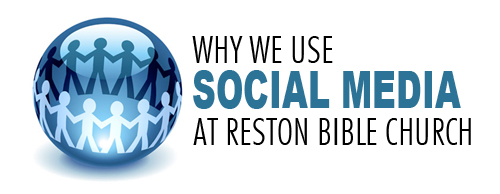Why We Use Social Media at Reston Bible Church
As a church whose greatest desire is to know Christ and to make Him known, we are bearers of the greatest message of all time. The constant proclamation of the gospel – both for the edification of believers and the awakening of sinners – is our duty and delight. Though the truths of the Gospel are innately powerful and timeless, the means through which the Gospel is communicated are as varied as history and culture.
Are all means of relaying the gospel good, effective, or equal? Not at all. Nor should all believers necessarily engage in certain means and methods of communicating the gospel. However, this is not to say that those means and methods be automatically dismissed for all merely because of individual conviction or cultural popularity. In an article entitled “Why and How I am Tweeting,” one pastor points out two prevailing responses toward internet-based social media (blogs, Facebook, MySpace, Twitter, etc.):
One says: These media tend to shorten attention spans, weaken discursive reasoning, lure people away from Scripture and prayer, disembody relationships, feed the fires of narcissism, cater to the craving for attention, fill the world with drivel, shrink the soul’s capacity for greatness, and make us second-handers who comment on life when we ought to be living it. So boycott them and write books (not blogs) about the problem.
The other response says: Yes, there is truth in all of that, but instead of boycotting, try to fill these media with as much provocative, reasonable, Bible-saturated, prayerful, relational, Christ-exalting, truth-driven, serious, creative pointers to true greatness as you can.
The Creative Arts team of RBC resonates with that second type of response. We would put the use of social media in the category of “missional contextualization.” That is to say, these are culturally relevant tools used to reach and teach in ways people around us are familiar with. Just as a missionary would study and use the language and culture of a people group in order to reach them as effectively as possible, so we desire to use social media and other communication technology as a way of effectively reaching, teaching and preaching to those around us.
The New Testament in particular clearly shows us the importance of missionally contextualizing Gospel truth. Scripture emphasizes communicating its timeless truth in ways that people of specific times and cultures can understand and relate to. As a brief example, Jesus often teaches in simple parables about coins, sheep, seeds and bread (Luke 15:1-10, Matt. 13, John 6) – these are visual themes his audience can relate to and connect with in order to grasp biblical truths. Paul likewise reasons with Jews from their own Scriptures, quotes pop-culture literature to philosophers and references familiar pagan gods in order to contextualize the Gospel and teach about Jesus (Acts 17). And undoubtedly, the greatest example of missional contextualization is God the Father, who entered into humanity and engaged in human culture as Jesus the Son in order to visibly explain Himself to us in a way that we could relate to, connect with and understand (John 1:14, Gal 4:4-5, 1 Tim. 3:16).
Again, as Christians, we are vessels of the greatest message ever – the gospel. Both believers and non-believers alike are in continual need of the gospel and its application to our lives. Social websites, graphic design, videography, etc., are timely methods to speak into the culture of Northern Virginia (and beyond) with the purpose of proclaiming and reinforcing the worth, relevance, and glory of the gospel of Jesus. Though vastly inferior to the gospel itself, we consider these methods as vessels useful in proclaiming Christ’s great worth. To Him be the glory as we seek to know Him and make Him known through social media.

